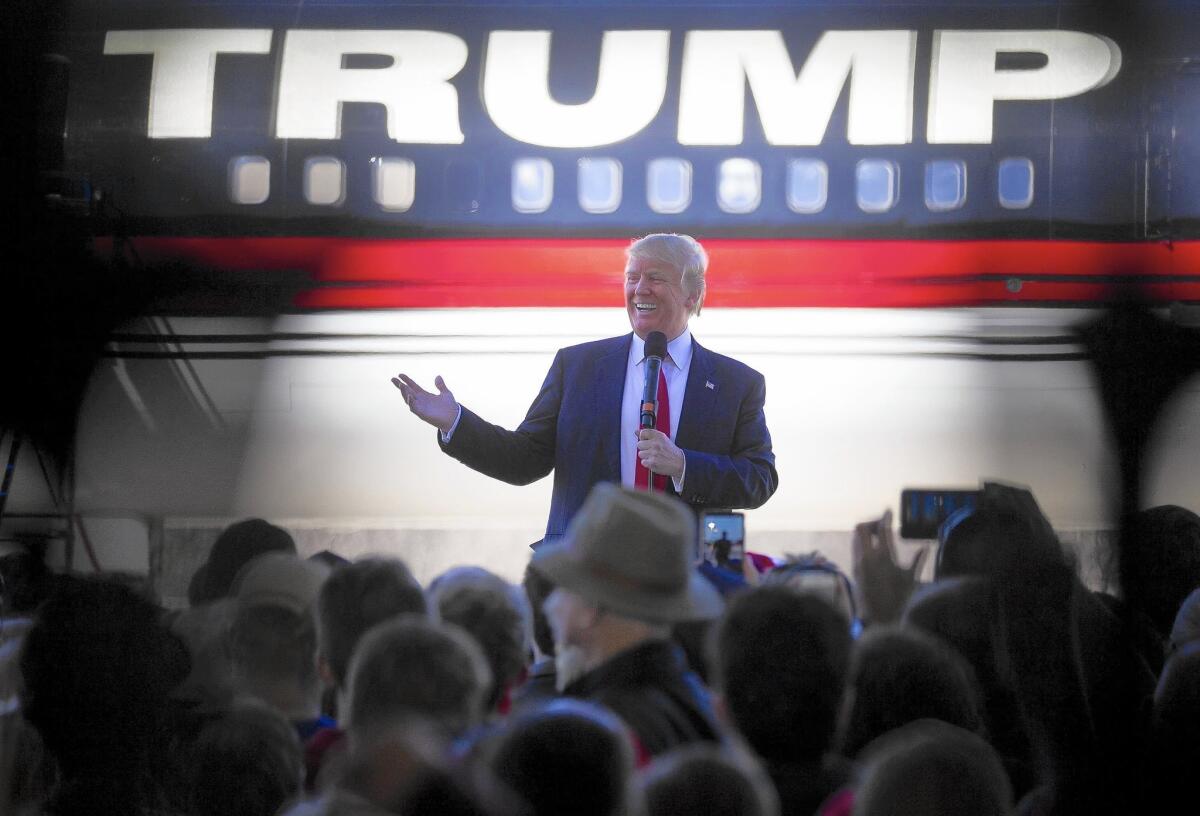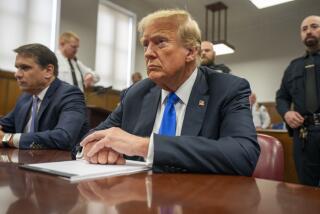From the archives:: What a Donald Trump presidency might actually look like

Reporting from WASHINGTON — Editor’s note: Back in February, Times political writers assessed how Donald Trump might govern if he was elected President. Here’s what they had to say:
President Trump.
A lot of people have trouble putting those two words together.
“I don’t even want to get into that. ... God,” said John H. Sununu, who was White House chief of staff under President George H.W. Bush. “I don’t even want to be in a story that has that assumption in it.”
The assumption can’t be brushed aside, however. The chance that Donald Trump will win the Republican presidential nomination has grown dramatically with his victories in early-voting states and his leads in polls of the states that vote over the next three weeks. The intense attacks that Trump’s leading rivals, Sens. Marco Rubio of Florida and Ted Cruz of Texas, have waged in recent days provide a good measuring stick for their concern that he could soon race beyond their reach.
And although lots of Republican strategists fear — and Democrats hope — that Trump would stand no chance in a general election, many of those same people confidently predicted his demise in the primaries.
So, with an election win no longer a farfetched notion, what might a Trump presidency look like?
“It would be chaos,” Rubio said in an interview Friday on CBS. Trump, he said, “refuses to answer questions on any specific public policy” and “has no ideas of any substance on the important issues.”
That’s not entirely true, however. For voters interested in policy, Trump has indeed been frustratingly vague. The issues page on his campaign website is sparse. On some matters, he refuses to be pinned down. On others, he openly admits not knowing much, as he did when asked in Nevada recently about federal land ownership in the West.
Nonetheless, in eight months of campaigning, 10 debates and scores of speeches and interviews, the New York billionaire has set out his top priorities and given a fairly clear sense of how a President Trump might approach his job.
In ideological terms, Trump scrambles traditional lines — borrowing some ideas from the left, others from the right.
He shows no particular interest, for example, in the long-standing conservative Republican goal of shrinking the size of the federal government. Asked in Thursday’s debate how he would balance the federal budget, he fell back on the slogan of eliminating “waste, fraud and abuse” and named only two specifics that he would cut: the Common Core education standards, which aren’t a federal spending program, and Environmental Protection Agency regulatory powers that he said he would shift to the states.
Indeed, one of his most specific pledges — to reject any cuts to Social Security or Medicare — points in the other direction. Coupled with his pledge to increase military spending, Trump’s refusal to cut programs for the elderly would put about 60% of the federal budget off limits.
He has also, at least in general terms, endorsed a role for the federal government in guaranteeing healthcare coverage. In Thursday’s debate, he resisted taking a more conservative position when Cruz and Rubio prodded him on the issue.
In contrast to his vagueness on the size of government, Trump is absolutely clear on the central theme of how he sees the presidency: the personal use of executive power.
In almost every statement he makes, Trump depicts the presidency as an arena in which he would fix problems through the exercise of his will and negotiating ability.
A characteristic comment came in an interview with ABC’s “This Week” in response to a question about Russian President Vladimir Putin.
“I have been an extremely successful deal maker. That’s what I’ve done over years,” Trump said. “And I know people, because deals are people. And I think I’ll get along very well, for the good of our country.... I’ll get along fine with Putin.”
Trump’s rivals in the GOP race routinely denounce President Obama as having exceeded the powers of his office. Trump says Obama acted “stupidly” and made the wrong decisions, but he’s less likely to emphasize the claim that Obama has tried to make the office too powerful.
Even the most forceful modern presidents, however, quickly discover the limits of what they can do.
“It’s not that he can come in, start with a clean sheet of paper,” said Andrew Card, who worked for the last three Republican presidents, including 5 1/2 years as George W. Bush’s chief of staff. Congress, the courts and the bureaucracy of federal agencies guard their own prerogatives.
“Governors tend to understand that better than CEOs,” who have far more authority over their companies than a president has over the government, Card said.
“When you’re the president, you’re not a dictator.”
TRAIL GUIDE: All the latest news on the 2016 presidential campaign >>
That’s not to say a president lacks power. Some of Trump’s most controversial plans could be carried out by executive authority. Many legal experts believe, for example, that Trump could impose his plan to bar most foreign Muslims from entering the U.S., at least for a while, because the president has broad authority over immigration, particularly where it intersects with national security.
“He will have a very easy time doing whatever he can do through executive authority alone. That includes the conduct of foreign relations, up to a point,” said William Galston of Washington’s Brookings Institution, who worked in the White House under President Clinton.
By contrast, “he would have a hard time doing anything that requires the cooperation of Congress.”
If elected, Trump would take office after what amounts to a hostile takeover of the Republican Party and over the opposition of Democrats. He probably would not be able to count on much support from either side on Capitol Hill. That would mean trouble for his promises to build a wall along the Mexican border or to round up and deport the roughly 11 million people currently in the U.S. without legal authorization. Both would require Congress to approve billions of dollars in new appropriations even if Trump could pressure the Mexican government into reimbursing the U.S. for the cost of the wall, which Mexico says it won’t consider.
On foreign policy, a President Trump would face a different set of constraints — other countries.
Trump has repeatedly denounced current arrangements under which the U.S. guarantees to defend its allies in Europe and Japan, saying Americans are getting taken advantage of.
“Those days are gone,” he said a few weeks ago at a New Hampshire rally.
If Trump really wants to end that obligation, he would have to do away with treaties that have defined U.S. foreign relations since the 1950s, including the U.S.-Japan defense treaty.
That possibility has already begun worrying the Japanese, said Kori Schake, a former aide to George W. Bush who recently met with Japanese officials to discuss defense issues. Any move to change the treaty could cause allies in Asia to reconsider their cooperation on issues the U.S. cares about, she noted.
The change also would not save the sort of money Trump suggests. Japan, Germany and South Korea pay much of the cost of keeping U.S. troops in their countries, so stationing forces in Japan costs only about 10% more than keeping them in rural Texas, said Schake, a research fellow at Stanford’s Hoover Institution.
Other Trump promises go far beyond what a president can do.
A staple of Trump’s recent stump speeches, for example, has been to criticize Carrier Corp., a unit of United Technologies Corp., for its plan to move two air-conditioner manufacturing plants from Indiana to Mexico, which he said would cost 1,400 U.S. jobs.
“If I’m the president, here’s what we do,” Trump told about 5,000 people at a recent rally at a casino resort in Las Vegas. “We write them a little note — we congratulate them on their move; we hope it goes well.”
“And we tell them the following. We tell them that every time you make an air-conditioning unit, and every time you send that unit into the United States, you’re going to pay a 35% tax.”
A long, sustained roar of cheers filled the arena.
But the president has no power to impose taxes, and retaliatory tariffs can only be applied in specific circumstances defined by complex laws and regulations. Congress has rejected far milder proposals to retaliate against companies that move manufacturing jobs overseas. Republicans in particular have opposed such ideas, which might preserve thousands of manufacturing jobs, but would also immediately and sharply raise costs for millions of U.S. consumers.
That example points to a problem that could quickly trouble a Trump presidency.
“You have to tell people ‘no’ all the time” in government, said Rob Stutzman, a Sacramento-based political consultant who worked as a top advisor to another larger-than-life figure, former Gov. Arnold Schwarzenegger, and who backs Rubio. “It ultimately is a business where you disappoint people.”
That fact hits all presidents, eroding their popularity over time, but it might particularly affect Trump because he has built his campaign around personal dynamism and promises that few think are possible to fulfill.
“There’s never going to be a wall. Mexico is not paying for anything. Apple’s not building iPhones in the United States,” said Stutzman. “My guess is he’ll hire very well — hire very capable people — and he’ll take their counsel, but then I think he finds himself in a difficult position of trying to sustain political capital because he’ll have to start explaining why he can’t.”
ALSO
Live election updates on Trail Guide
Voter voices: America’s state of mind on election day
More to Read
Get the L.A. Times Politics newsletter
Deeply reported insights into legislation, politics and policy from Sacramento, Washington and beyond. In your inbox three times per week.
You may occasionally receive promotional content from the Los Angeles Times.













